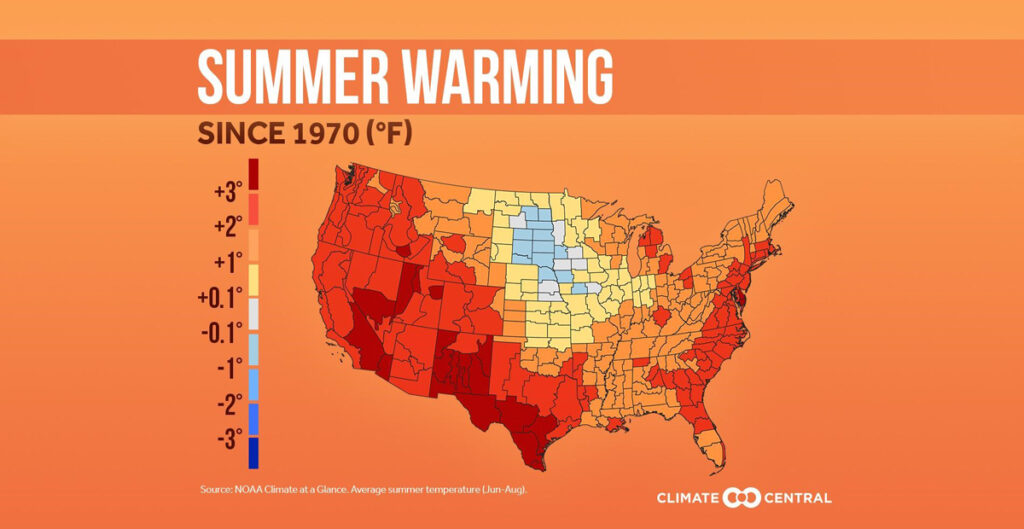Dear Friends,
“Disruption” was the word-of-the-month for June. C-Change Conversations sees a warming globe as the biggest disrupter of all, with cascading effects from droughts and wildfires to disasters that are both economic and social in nature.
This year’s shockingly early extreme weather events are a case in point. After record temperatures and drought last year, the Western United States was again in the grip of an unprecedented heat wave by mid-June – barely the start of the 2021 hot season. It’s premature to blame climate change definitively. After all, mercury typically spikes in the summer. But with the Olympic Track and Field trials disrupted when the temperatures on the track measured 150 degrees in normally cool Eugene, Oregon, clearly something else was going on. To put it mildly, as NPR did, this is “not your average heat wave.”
The good news is that forces across the economy are responding with large and small disruptions of their own aimed at securing human safety, well-being, and economic opportunity. This month, we’ll brief you on a few big disruptive developments and also spotlight some mid-sized innovations with potential for big, positively disruptive payoffs.
As ever, we hope you’ll pass along anything you find interesting. And, of course, use the information to enrich your own conversations about climate change with friends, family, business associates, and community and political leaders.
Warmly,
The C-Change Conversations Team
Notable Quote
“We find that millions are at risk … not years in the future, but this summer.
News of Concern
Behind the sizzling headlines about blistering weather is a disturbing pattern of ever longer, broader, and hotter American heat waves. And while we don’t know exactly how climate change is contributing to the intense heat in the Pacific Northwest, we do know it is having at least some impact.
Similar weather patterns, of course, are now being felt world-wide with direct and long-term implications for life-sustaining resources that will affect us all – but some of us sooner than others. The Northern Triangle nations of El Salvador, Guatemala, and Honduras – with high populations of subsistence farmers – have endured drought five out of the past ten years. The resulting food insecurity is considered a key factor in pushing some 300,000 migrants north to the United States each year [paywall].
Water supplies and essential food production are obviously the most critical vulnerabilities in the agricultural sector, but climate disruption is also affecting cash crops and products such as chocolate, coffee, wine, and beer. And, in a sign of the times, even salmon are struggling against drought. California’s Fish and Wildlife Service is planning to truck 17 million Chinook salmon downstream from their hatching areas in the Central Valley because their regular water routes to the sea have already dried up or become too heated for the fish to migrate on their own.
It turns out that NIMBYism thrives in unexpected corners. Local residents and environmental activists – who otherwise support clean energy – are disrupting utility-scale solar projects [paywall]. Their concerns – including aesthetics, landscape preservation, and endangered species – show that vexing tradeoffs on the road to carbon neutrality remain.
And in the category of not seeing eye to eye, we’re sorry to see a face-off brewing between Democratic municipal governments and Republican state legislatures over natural gas in private homes. As a growing number of towns and cities around the nation enact laws to prohibit or discourage gas-fueled cooking and heating, a growing number of states are passing laws to prohibit such legislation. The outcome of the battle may disrupt the utility industry and reshape domestic demand for natural gas [paywall].
News of Hope
The aforementioned face-off notwithstanding, the big news in partisan politics in June was the tiny crack in the polarization around climate change. Nearly one-third of congressional Republicans just launched the Conservative Climate Caucus, and others are readying to unveil climate policies of their own.
And in boardrooms and shareholder meetings, more and more of America’s investor heavyweights are pushing the climate agenda. “Wall Street senses a new climate [no pun seemingly intended] and is positioning itself accordingly,” writes Tim Quinson in Bloomberg. Hurrah! Black Rock and Vanguard, for example, are vocally happy to back shareholder initiatives to disrupt the status quo at companies like Exxon and beyond, though we observe a robust dose of risk analysis at play in their calculations, also.
June saw several disruptive legal and policy initiatives at the national and state levels. Let’s start with Belgium. In a landmark ruling, a Brussels court has declared the country’s failure to meet its climate targets breached the European Convention on Human Rights. It’s the latest legal victory against governments that have broken climate promises and could have international implications.
In more news from Brussels, the 27-nation European Union is reportedly preparing to impose levies on imported goods with high levels of “embedded” carbon such as steel, cement, and aluminum. The idea is to penalize countries with lower standards for carbon reduction as the EU tightens its own environmental rules and shoots for climate neutrality by 2050.
Closer to home, the state of California’s insurance regulator is endorsing sweeping changes to discourage new house construction in fire-prone areas [paywall]. The proposed changes are a bit wonky but important, with potential for disrupting the state’s real estate market and becoming a model for other states where climate change is making home insurance a lynchpin issue.
Finally, we’ll leave you with this: “ecocide” has been defined by a panel of 12 legal scholars from around the world as a new, international crime with intended equivalence to genocide. Although the declaration carries no legal weight at this point, it envisions prosecutions before the International Criminal Court in the Hague and is considered an important milestone in the campaign to prosecute individuals and companies responsible for severe and widespread or long-term environmental damage, such as extensive deforestation of the rainforest or the Chernolyl nuclear accident.
Notable Innovations
Carbon utilization – aka “carbontech” – is gaining momentum and even profitability [paywall]. Carbontech is a catch-all phrase for commercial products made with CO2 emissions captured from power plants or other sources. By one estimate, the international market for carbontech products could be nearly $6 trillion.
Researchers at the University of Cambridge have found a way to replace single-use plastics with a plant-based material they are calling “vegan spider silk.” The process reportedly is scalable, energy-efficient, and results in a “plastic-like free-standing film” which can even be composted at home.
And if that doesn’t excite you, how about solid-state batteries? As elusive as pixie dust, this long-promised technology could, among other things, double or triple the range of electric cars and reduce recharging times to a fraction of current requirements. Multiple companies are working on them, which means we should finally see solid-state batteries on the market in the next few years.
Notable Graph

According to Climate Central, summers are getting hotter, and not just in the Pacific Northwest. In the past 50 years, 74% (179) of the 242 cities analyzed recorded an extra week or more of days with above-normal temperatures. The top 30 cities with the greatest increases, all recording a month or more of additional days above normal, were concentrated in the southern United States – particularly in the Southeast and Texas.
And areas on the map above that appear to be cooling during summer months? Those areas are still warming overall, but most of their warming signal shows up in winter. There is no definitive answer about the summer warming hole across the Upper Midwest/Northern Plains, but as Climate Central Meteorologist Sean Sublette wrote recently, “The early reasoning behind the cooling signal in the northern Plains is likely related to land use – there is now a greater coverage of corn and soybeans in the hotter months. Colloquially known as ‘corn sweat,’ the plants give off more moisture from their leaves … which leads to more evaporation, which has a cooling effect (like when you get out of a pool). But this is an area of active research.” To learn more, read Summer Climate Change in the Midwest and Great Plains due to Agricultural Development during the Twentieth Century (2019).


